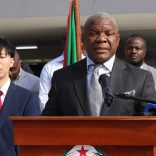Mozambique: Government wants forensic audit of last 10 years of LAM accounts
Economist: “Mozambican budget for 2018 is” incredibly optimistic”

File photo
The Economist Intelligence Unit (EIU) believes Mozambique’s State Budget (OE) for 2018 is “unbelievably optimistic” in its revenue forecasting, and anticipates that cuts in expenditure will continue in the social sectors.
“Most cuts in public spending will continue to have a stronger impact on the social sectors, including health and education,” reads the Economist’s economic analysis unit’s commentary on the Mozambican budget for next year.
In the commentary, to which Lusa has access, the Economist magazine analysts describe the budget’s economic assumptions as “incredibly optimistic”, stressing that this will hinder the budget’s implementation.
The 2018 State Budget forecasts expenditure of 300.7 billion meticais and revenue of 222.8 million, or a deficit of 77 million meticais (one million Euros), according to the figures announced at the end of September.
The deficit will be funded with domestic credit equivalent to 2.3 percent of GDP, external credit equal to 5.4 per cent of GDP, and unspecified donations amounting to 2.6 per cent of GDP.
“First, the government expects external funding to reach US$318 million, but as it has not yet met donors’ demands for more transparency, the freeze on international financing, which is worth 10 percent of public expenditure, will probably continue,” writes the EIU.
“Second, the government expects to finance the debt deficit,” but, analysts argue, “As the country does not guarantee full transparency in public finances, it must remain beyond IMF financial action”, which means that negotiations with creditors of public debt and loans to public companies “will not progress”.
The solution will therefore be to issue more domestic debt, “but with a flurry of issues in 2017, simple refinancing current debt will put considerable pressure on the financial system, limiting the prospect of a net increase in borrowing”, the EIU argues.
“With revenues falling short of government targets and with debt probably not materialising, we expect an even greater accumulation of arrears in state payments in 2018,” forcing the government to cut spending still further.
“Non-urgent capital expenditures have already been resolved and, with elections in 2018 and 2019, the government will be reluctant to cut back on the high spending on the public sector,” the analysts conclude.













Leave a Reply
Be the First to Comment!
You must be logged in to post a comment.
You must be logged in to post a comment.